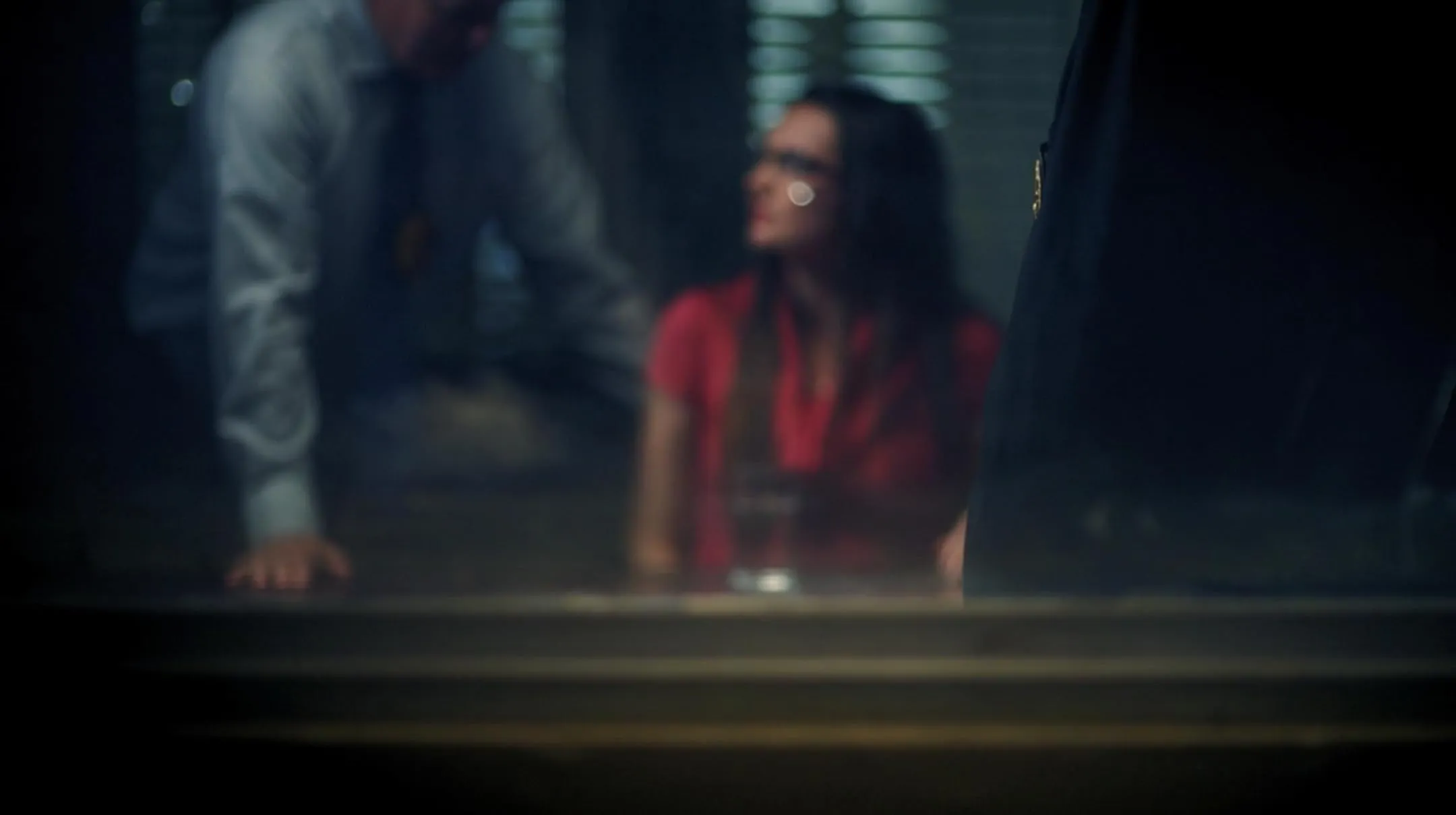True crime docuseries in their current form are both voyeuristic spectacles and existential reflections. They challenge viewers to go into the depths of human imperfection, where justice is rarely pure, and guilt is rarely clear. Little Miss Innocent: Passion. Poison. Prison. Fits squarely into this genre, but its structure—three tightly edited episodes—eschews the bloated expanse of many contemporaries, instead presenting a dense labyrinth of betrayal, death, and unsolved questions. This brevity feels almost surgical as if the documentary dissects its subject with the same precision as the poison that claimed Mary Yoder’s life.
Sauquoit, New York, becomes a character in its own right, an enclosed stage for the drama of innocence and guilt. Like many similar villages, Sauquoit presents the illusion of simplicity: peaceful streets, familiar faces, and the unspoken weight of shared histories.
However, beneath this surface are the tangled roots of human complexity. Here, life and death coexist in astonishing proximity. The death of Mary—a vibrant, middle-aged woman cherished by her community—broke this veneer, her death ringing like an unanswered question across the town’s collective psyche.
The case’s national attention is not an accident. It promises clarity—who killed Mary Yoder?—but only offers ambiguity. True crime, after all, thrives in this environment of moral ambiguity. Kaitlyn Conley, the young lady convicted of manslaughter, maintains her innocence with unsettling composure as whispers of familial betrayal—an affair, a shared Apple ID, anonymous letters—add to the confusion.
The series does more than just narrate a crime; it depicts the awful fragility of certainty itself, reminding us that beneath the surface of every human life is a hidden, unknowable abyss.
Poisoned Truths: The Fragile Architecture of Justice
Mary Yoder’s death was not a sudden extinguishment of light but rather a slow, terrible unraveling. This intimate betrayal converted a healthy, energetic lady into a weak body undone by the unknown. Her abrupt sickness began in July 2015 with a ripple: nausea, exhaustion, and a faint unease that suggested something was wrong.
Within days, it had turned into a torrent, sweeping her to a painful end. The autopsy showed a sobering truth: colchicine poisoning, a rare and precise toxin, had penetrated her body. This was no accident but rather an act of planned malice, which sparked the slow investigation machinery. This gear grinds not to discover the truth but to assign it.
Kaitlyn Conley, a young woman linked to the Yoder family by love, work, and proximity, became the focal center of this mechanism. Conley, a former girlfriend of Mary’s son Adam and later an employee at the family’s chiropractic practice, was convicted of first-degree manslaughter in 2017 and sentenced to 23 years in prison.
She remains an enigma, however, as she maintains her claim of innocence while casting doubt on Adam and Mary’s husband, Bill. The evidence against her—emails, an anonymous letter, and the purchase of colchicine from the workplace computer—indicates guilt. Still, the narrative is overly clean, and the edges are too sharp. The series challenges viewers to question: Is justice the pursuit of truth or a simple solution to chaos?
Little Miss Innocent: Passion consists of three episodes. Poison. Prison unfolds with a deliberate cadence, striking a balance between the data’s clinical precision and the interviews’ chaotic humanity. The framework reflects the case’s duality: the cold, forensic narrative of poisoning vs the warm, emotional undercurrent of grief and self-preservation.
Through reenactments, interviews, and Conley’s unsettlingly constructed testimony, the series paints a fragmented mosaic of a crime that defies coherence. It is not a story of guilt and innocence but of perception—how we construct and reconstruct truth in the face of unknowable truth.
Shadows of Motive: The Labyrinth of Guilt
The investigation into Mary Yoder’s death flickers like a distorted image in a fractured mirror, with each shard revealing bits of a truth that refuses to be complete. The medical examiner’s judgment was chillingly precise: colchicine, a deliberate and rare poison, was the weapon. However, the investigation that followed was anything but precise, weaving through opposing tales, damaged relationships, and the invisible currents of human secrets.
At its center was Kaitlyn Conley, whose life with the Yoders was distinguished by an unsettling familiarity. She was more than just Adam Yoder’s ex-girlfriend; she was a ghost who stayed in the family’s orbit long after the relationship ended. Colchicine purchased from the workplace computer and an anonymous letter blaming Adam that was later traced back to her appeared to be damning evidence against her.
However, the prospect of doubt loomed huge. Conley’s protestations of innocence became a gloomy refrain, her voice calm but measured, pointing instead to Adam and his father, Bill. Was her composure the veneer of a guilty conscience or the guilt of someone duped by the delicate building of justice?
Adam Yoder, known for his eccentric demeanor and explosive past, is a chaotic suspect. His relationship with Kaitlyn was regarded as poisonous and obsessive, with several allegations of harassment and violence. The anonymous letter that prompted police to check his Jeep, where they found colchicine, suddenly reframed him as the criminal. Adam’s instability, however, appeared to be more like a smokescreen than evidence of premeditation murder. Was his behavior motivated by grief, guilt, or something darker?
In comparison, Bill Yoder was a still shadow in Adam’s storm. His affair with Mary’s sister portrays him as a man capable of betrayal. At the same time, his prospective access to the office computer lends an unsettling reality to his motivations. Witnesses claimed to have seen him using the same computer associated with the colchicine purchase, and he had the technological ability to access it remotely. His delayed presence at the hospital as Mary lay dying feels almost cinematic in its ominousness—a long absence that whispers intent but proves nothing.
And then there’s the anonymous letter, a silent player in this tragedy. It arrived like a stone thrown into dark waters, its ripples deflecting the investigation’s course. This letter, which condemned Adam but returned to torment Kaitlyn, represents the case’s basic question: how much of what we know is truth and manipulation? In this labyrinth of guilt, the letter serves as both a clue and a trap, a reminder that the line between victim and perpetrator is frequently blurred in the pursuit of justice.
The Enigma of Kaitlyn: Innocence as a Performance
Kaitlyn Conley’s appearance in Little Miss Innocent feels like a meticulously crafted tableau—composed, deliberate, and relentlessly impenetrable. Her interviews, which form the docuseries’ emotional core, are a duality study: her calm voice and wide-eyed emotions imply a victim fighting against the tides of injustice, but beneath this veneer lies the faint but steady hum of calculation. She tears, but not excessively; she grins, but always with alarming precision. Her demeanor begs the question that pervades many true crime narratives: Is this the mask of innocence or the face of guilt worn well?
The evidence against Kaitlyn is both damning and troublingly circumstantial. The emails purchasing colchicine were traced to her working computer, and the anonymous letter accusing Adam was eventually linked to her. These threads work together to tell a story about premeditation. However, the narrative’s holes are extensive.
Conley was not working when the poison was ordered, and her phone and laptop were accessible to others, including Adam, Bill, and coworkers. Like a Rorschach test, the evidence defies clarity, forcing viewers to project their biases into the blank. Is she the mastermind behind this tragedy or the unwitting scapegoat?
Her claim of innocence, however, is based on both what she says and how she says it. Kaitlyn’s remarks are measured, and her emotions are categorized, which some may take as unsettling self-control. In contrast, others may see as the necessary armor of someone harmed. However, her representation is not perfect. She points fingers—at Adam, at Bill—with a precision that feels rehearsed, as if innocence depends on suspicion to survive. Her refusal to confess guilt and her seeming lack of regret paint a picture of a woman who remains an enigma not just to the audience but possibly to herself.
The reaction of viewers to Kaitlyn’s representation is as varied as the case itself. Some people are drawn to her composure, interpreting it as resilience in the face of injustice. Others withdraw, alarmed by what they perceive to be an act—her mannerisms are too polished, and her tears are too well-timed.
This dichotomy reflects the series’ wider existential tension: how do we, as viewers, determine who is worthy of belief? Kaitlyn Conley’s portrayal does not resolve this question; rather, it deepens it, forcing us to confront the unsettling prospect that innocence and guilt are not absolutes but malleable constructs created by the stories we choose to tell and believe.
Fragments of Truth: The Artifice of Storytelling
Passion. Poison. Prison is a silent but ever-present force affecting our perception of guilt and innocence. Sara Mast’s direction avoids overt stylistic flourishes, instead a measured, almost clinical approach. The minimalist and utilitarian reenactments feel less like narrative devices and more like transitory traces of a history that defies explanation.
They are deliberate in their restraint, avoiding overshadowing the genuine voices dominating the series. However, this sparseness creates an uncomfortable emptiness, as if the truth has been hollowed out, leaving only shadows where clarity should be.
While striving for tension, the music frequently borders on parody, with melodramatic tones that clash with the series’ typically restrained pace. It recalls the familiar rhythms of Dateline or 20/20 but without the polished theatricality. Instead, Mast appears to embrace the monotony of small-town tragedy, using long lengths of interviews and muted visuals to create an almost oppressive quiet. This technique has both advantages and disadvantages: it reflects the investigation’s slow, grinding ambiguity, but it also risks alienating viewers who desire the narrative propulsion common to true crime shows.
In contrast to its peers, the docuseries distinguishes out for its refusal to sensationalize. Mast does not steer viewers to a smooth closure, instead allowing the case’s contradictions to stay unresolved. It lacks the polished artifice of larger productions, but its rawness is its strength. Like the case it examines, the series is a fragmented entity—a mosaic of perspectives that never quite fit together, leaving us to question the story and the act of storytelling itself.
The Weight of Judgment: Spectators in the Court of Uncertainty
Little Miss Innocent’s audience is more than passive observers; they actively participate in perception testing. Viewers’ opinions of the docuseries and Kaitlyn Conley’s portrayal are as varied as the case itself. Some are drawn to her calm, cool manner, interpreting her as a victim of societal failure, a young woman caught up in a web of circumstantial evidence and family instability.
Others are repulsed by what they perceive to be a deliberate performance—her wide-eyed emotions and measured tears offering manipulation rather than authenticity. In this divergence, the viewers become jurors tasked with determining Kaitlyn’s identity based on intangible human behavior clues rather than empirical evidence.
This tension extends beyond Kaitlyn’s guilt or innocence; it reverberates across the Yoder family and the town. If Kaitlyn is innocent, the Yoder family’s grief is poisoned by misplaced blame, and their weeping is wrapped in ice. If she is guilty, her betrayal extends beyond Mary Yoder to the trust and closeness that constituted her relationship with the family. For the community, the case exposes a wound that refuses to heal, dividing neighbors into factions of belief and forcing them to confront the fragility of collective truth.
The series’ ambiguity echoes the true crime genre’s dark fascination, in which fans are drawn not to answers but to the existential anguish that results from their absence. Little Miss Innocent denies finality, leaving viewers to confront their biases and the unpleasant reality that justice, like truth, is a changing shadow. The series’ refusal to resolve is its greatest frustration and its most haunting triumph, cementing its place as a meditation on the human desire to find meaning in the unknowable.
The Review
Little Miss Innocent: Passion. Poison. Prison.
Little Miss Innocent: Passion, Poison, and Prison is a disturbing reflection on the fragility of truth and the dark intricacy of human relationships rather than a traditional true crime exposé. Sara Mast's restrained directing defies simple answers, forcing viewers to navigate contradictions and moral ambiguity. Though its speed and production may turn some off, the series excels in examining guilt, innocence, and the disturbing subjectivity of justice. It remains like a shadow, leaving unanswered questions long after the final frame.
PROS
- Thought-provoking exploration of guilt, innocence, and justice
- Compelling interviews and emotional depth
- Ambiguous narrative encourages viewer introspection
- Avoids sensationalism common in true crime media
- Tight, well-edited three-episode structure
CONS
- Sparse reenactments and minimal stylization may feel flat to some
- Slow pacing and monotony in delivery could alienate casual viewers
- Limited production quality compared to larger true crime series
- Overly restrained direction leaves some questions unanswered
- Music and tone occasionally stray into melodrama




















































